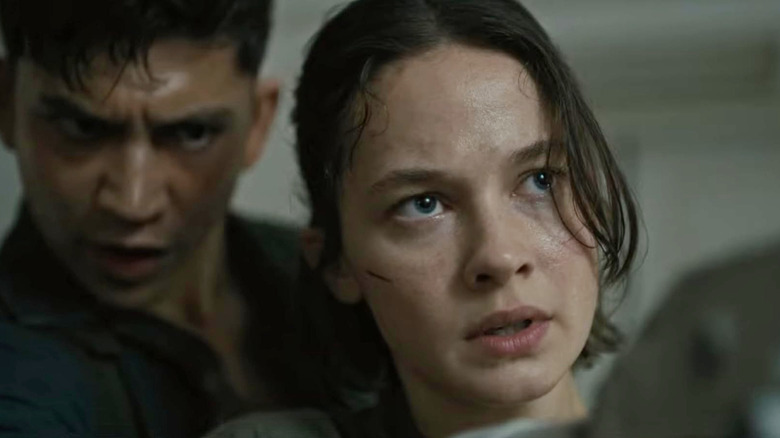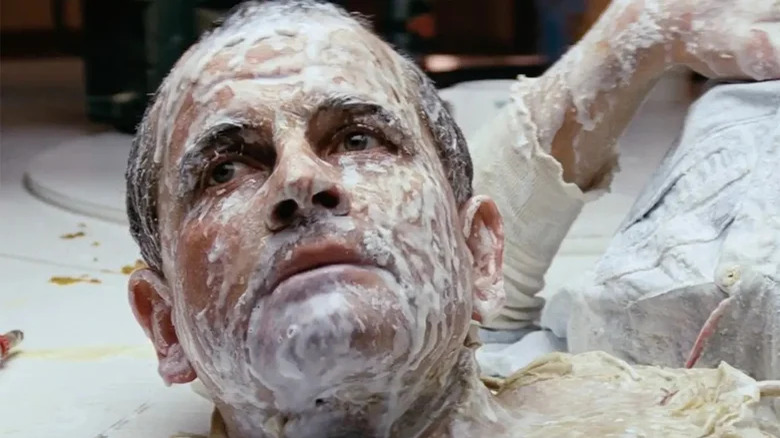The Real Reason Fede Alvarez Digitally Resurrected Ian Holm For Alien: Romulus
Heavy spoilers for “Alien: Romulus” ahead.
“Alien: Romulus” is a fun, thrilling romp, a love letter to the “Alien” franchise and a movie that pays homage to every single aspect of it (from the good to the not-so-well-received). There are nods and references to every “Alien” project, including Ridley Scott’s prequels and the previous sequels. (If you need a reminder, here’s a recap of the entire “Alien” franchise ahead of “Romulus.”)
But as great as it feels to see a proper Xenomorph unleashing chaos and mayhem again, “Romulus” is also a stark reminder that the true monster in the “Alien” franchise has always been the Weyland-Yutani Corporation. The Xenomorph may be delivering the killing blow, but it is The Company that is constantly looking for new ways to kill its blue-collar workers.
Then there’s that cameo. Without a doubt, the most controversial moment in “Romulus,” and also the worst decision director/co-writer Fede Álvarez makes, is bringing back the late Ian Holm as a new synthetic called Rook. It amounts for little more than digital necromancy and is a horrible, disrespectful move.
Speaking with Entertainment Weekly, Álvarez tried to justify the decision to bring back Holm specifically. “There’s just a limited amount of synthetics, and that’s why some come back a few times,” Álvarez explained. “We were talking, and Ridley and I felt like the one that has never been back was the best one of them all, the original model played by Ian Holm.”
Worse still is that Álvarez admitted to using AI to create the illusion of Holm being back. “We knew we were going to create an animatronic,” the filmmaker told the Los Angeles Times, justifying the decision. “And later we were going to do CGI enhancements in the mouth and in the eyes depending on the shots.”
Why Alien: Romulus brought back Ash (kind of)
Álvarez said he reached out to Holm’s widow, Sophie de Stempel, who was enthusiastic about bringing Holm back as a digital monstrosity. “In the last 10 years after ‘The Hobbit,’ Ian Holm felt like Hollywood had turned its back on him and his widow felt he would have loved to be a part of this,” Álvarez explained. “He loved this character in particular.”
Still, it’s one think to bring back a synthetic being that sort of resembles Ian Holm — after all, Lance Henriksen, though alive, came back as a legless torse on a table in “Alien 3” so why not do the same here? Sure, the film justifies this by making the synthetic not Ash from the first “Alien” but a new robot named Rook. But still, the intention is clear. Though Álvarez says that Rook was designed as an animatronic and mostly done with on-set puppeteering, he admits there is still CGI enhancements in postproduction on the creature’s eyes and mouth “so that the animatronic had a little more life.” So far, the biggest (and only) justification from people regarding Rook’s existence is that he is meant to look a bit uncanny since he’s a faulty robot. But with that logic, what is the point of using CGI and AI to make the animatronic more life-like? Leave it as a weird robot who doesn’t move right.
As it stands, Holm’s “cameo” in “Alien: Romulus” is less a love letter to a great actor and a memorable character, and more like the tasteless CGI necropolis of “The Flash.”
“Alien: Romulus” is now playing in theaters.
















Post Comment